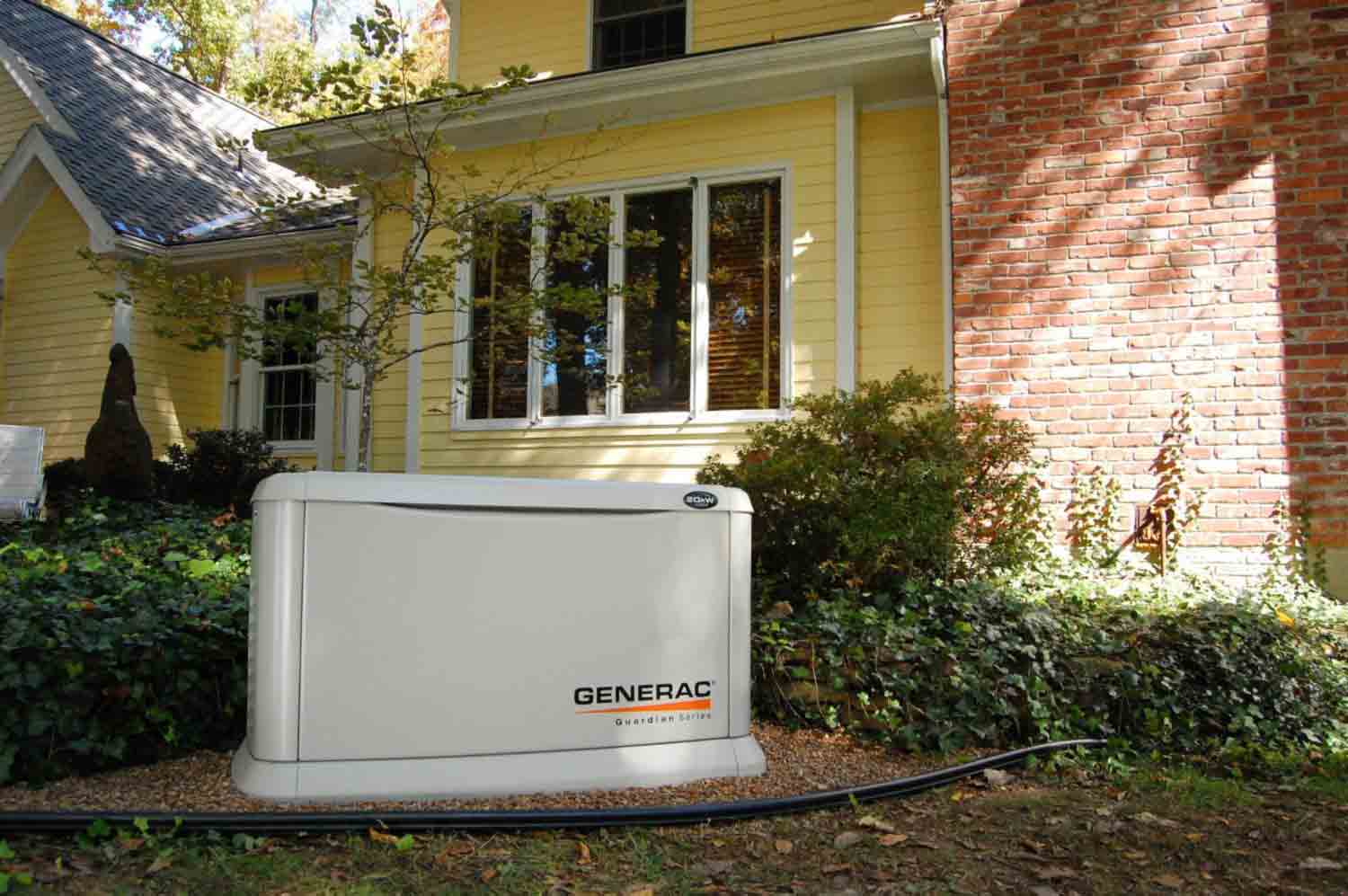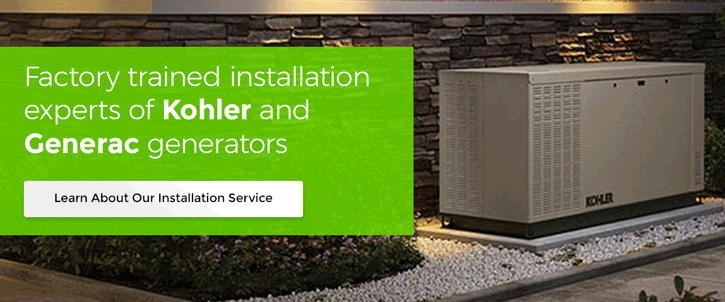If you’re in the market for a generator, you’ve come to the right place. You probably have a full list of questions, including, “What size generator do I need? Which fuel type is better: natural gas vs. liquid propane? What brand should I trust?”
We’ve designed this generator choosing guide to answer all of those questions and more, so that you can find the best standby generator for your home.
Whether it’s for partial or full house coverage, we’ve got the insights you need to avoid generator shopping in the dark (pun intended!).
Here’s everything you need to know to start narrowing down your backup home generator choices:
What Exactly is a Standby Generator?
A standby generator is a power source that’s permanently installed right outside your home, in case you lose power. It often resembles an air conditioning unit, and runs on your home’s existing propane or natural gas lines.
Standbys generally operate on two types of switches: an automatic or a manual switch. Just like it sounds, an automatic transfer switch (ATS) works on its own, without you having to manually turn it on.
This unit monitors your electricity, patiently waiting for an interruption in your input, and kicks on in the event of an outage. Within seconds of your lights going out, your standby generator works to supply your house with backup power. (Because of this, home generators are often referred to as backup generators too).
Manual switches simply need be flipped on, and your power returns!
How Do Standby Generators Operate?
Let’s learn about the mechanics of a home backup generator system.
A standby generator is installed right outside of your house, protected by weather-resistant casing, oftentimes with commercial-grade and corrosive resistant metals like aluminum or steel, or plastic. The unit is connected to your home’s wiring, and attached to a transfer switch.
This transfer switch can be automatic or manual, meaning it either 1.) monitors your electricity and turns itself on when a disconnection in power is detected, or 2.) you can flip it on manually when your lights go out.
Activating the switch will transfer your electrical circuits to the backup power system provided by the standby generator. The nice thing about relying on power from a standby unit is that it can run until your utility power returns, whether it takes a few hours or a few days to fix the issue (so long as you have an adequate fuel supply!). And with an automatic unit, you do not need to be present for it to fire up like you would a portable generator.
In fact, you may be wondering if a portable generator offers enough juice to power your home. In many cases it can, but there’s a number of advantages to opting for standby unit instead. Let’s see what makes these two types of generators so different.
When to Choose a Standby vs. Portable Generator
If you’re on the fence of whether to purchase a portable or a permanently installed backup generator, here are a few things to consider:
- What do you need powered? A permanently affixed, standby generator is better suited for powering lights, heating and cooling systems, sump pumps, or anything that is hardwired into your home like security systems. With a portable generator, appliances need to be plugged directly into the unit using extension cords, which must be rated for the necessary electrical needs and distance. All of this can be a tangled mess, and a lot of wattage calculation is involved to make sure you’re not overloading any systems! That’s often why you’ll see portable generators at events— powering a few outdoor lights or a bar— more often than you’d see these smaller units powering whole home.
- Do you require smooth power? Devices like televisions and computers often require a more consistent, smooth power to run without damaging the appliances by overloading. A disruption can fry your devices or damage your generator itself and you need a unit that can guarantee a steady connection. Portable generators aren’t as well suited for powering these electronics as a reliable standby unit.
- How long does it need to be running? Portable generators often run on gas and need to be periodically refueled, since they have a small tank. Portable units also are uncovered, with the engine exposed to the elements. Because of this, they aren’t ideal for harsh weather and cannot be brought inside or ran in an open garage because of the risk of carbon monoxide poisoning from engine exhaust. If your power is out for many days, a portable generator is not ideal.
- Do you prefer a hands-on or hands-off approach? Whereas standby generators often kick on automatically or with the flip of switch, portable generators need to be manually fired up, refueled and monitored. They’re not going to help you if your power goes out while you’re traveling or away from your family to fire up the unit.
Generally, here’s what our electricians recommend when deciding between a standby vs. portable generator:
- Powering your whole home? You need a standby.
- Juicing sensitive electronics like computers, TVs, etc.? Standby.
- Want to ensure the food in your fridge doesn’t spoil or your home surveillance continues while you’re away? Standby.
- Don’t want to deal with refueling and plugging in specific cords/devices with limited cord reach and wattage concerns? Standby.
- Need long-term power, to power part or your entire home for a few days on end? Standby.
- Just need lights and basic appliance usage for a few hours? Portable will probably do.
- Have a budget under $2,000 and only need short-term home power in the event of an emergency? Portable will get you by for a half day.
- Need a little extra juice to power high voltage equipment for a backyard event, like DJing equipment, filling an inflatable bounce house, etc. Portable comes in handy!
If you’re still considering a portable generator vs. a standby unit, read our article on other considerations.
What is Natural Gas?
Natural gas is a gas mixture of several gases, but mostly methane. It takes the form of a light, airy gas at normal temperatures and pressures.
It’s important to note that NG is not the same as gasoline, like you’d fill your car with, as gasoline is always a liquid at normal temperatures and pressures. While both are indeed fuel sources, a standby generator that is fueled by “gas” doesn’t run on the conventional gasoline you’d get at a gas station.
Natural gas pipelines may run beneath your home or be installed professionally, and are regulated by meter and fuel line.
What is Liquid Propane?
Propane is a byproduct of natural gas processing and petroleum refining. It’s a liquid by nature, which is converted into a gas when used for power. When your liquid propane tank is heated up for use, the liquid on the surface boils and turns into a gas, used to fuel your generator.
Liquid propane can be delivered via truck and stored in a permanent underground tank installed near your standby generator.
What Are the Advantages & Disadvantages of Each Fuel Type?
Let’s take a look at the big differences between natural gas and liquid propane generators:
Natural Gas
| Advantages |
Disadvantages |
|
|
Liquid Propane
| Advantages | Disadvantages |
|
|
Ultimately, both natural gas or liquid propane-powered generators can be smart choices for homeowners. Perhaps the largest influencer for many is if they even have access to natural gas lines, as some rural areas may not have underground piping.
How to Pick the Right Size Generator
Standby generators are sized in units of power called kilowatts (kW). In terms of conversion, one kilowatt equals 1,000 watts (so a 20 kW generator produces 20,000 watts!).
Generators also have a thing called an automatic transfer switch (ATS), which we discussed in the earlier section above. The ATS tells your generator to kick on when a disruption in current is detected; and this switch needs juice to operate— usually the equivalent of your breaker panel’s amperage (so a 200-amp breaker panel needs a 200-amp switch).
Now that you know the basics about how generator sizing, let’s talk about why it’s so important to find the right size unit for your home.
- A generator without adequate power limits your luxuries. If you get a generator that does not have the kW your appliances or home system requires, you can be without important features when in the dark.
- Voltage drops can damage devices. If you are trying to power more than your generator can handle, you can experience voltage drops. These drastic leaps can not only damage your linked appliances, but it can also harm the generator itself.
- Overkill wastes your money. If you go all out and buy a generator with more watts than you need, you’ll be paying a pretty penny for unnecessary juice.
Determining Your Wattage Requirements
Ask yourself what devices you absolutely cannot do without during an outage and write them down. Yes, we said write them down! We need to do some math.
Honda made a nice list for us that shows how much juice a number of household devices require to operate. Take a look at their wattage estimation sheet or try this calculator from Energy.gov, which can reveal the wattage of other items not listed on Honda’s page. Just stick to Energy.gov’s wattage rating for your selected item, and jot that down, without worrying about using the calculator itself.
In a recent blog post, we outlined an example situation, which we copied again here to help you determine the right wattage for your standby generator:
Example: A Tale of Two Homes
John and Jeanette Wilson and the Jones Family both have about 2,000 square foot homes in the Naples area, but have different ideas on what they want covered if there is a power outage.
John and Jeanette Wilson want to only power the “essentials” if the power is out. They want to stay comfortable with AC and hot water, but don’t necessarily want to keep their whole house at full running capacity.
Here’s the Wilson’s list:
- 2 Light fixtures – 175W (far less if they are using LED bulbs)
- Electric Water Heater – 4000W
- Central A/C – 4500W
- Refrigerator – 1500W
- Phone and tablet charging- 30-50W
TOTAL WATTAGE: 10,225
The Wilsons should look at an 11kW home backup generator. With an 11kW backup generator, they should be able to run their basics, keeping themselves comfortable, and their food cold and safe from spoilage.
The Jones family wants to power their whole home up, as if there were no outage. They also made a list of the appliances and devices they want powered.
Here’s the Jones’ (larger!) list:
- 15 Light fixtures – 1225W
- Electric Water Heater – 4000W
- Central A/C – 4500W
- Refrigerator – 1500W
- Phone/tablet charging – 50W
- 2 Laptop computers – 150W
- Microwave – 1000W
- Stove/Range – 3000W
- Dishwasher – 1500W
- Clothes Washer – 1500W
- Clothes Dryer – 1500W
- 3 LCD TVs – 450W
- WiFi & Cable Modem – 40W
- Garage Door Opener – 2300W
TOTAL WATTAGE: 22,715
The Jones should consider a 25kW generator to power their whole home. There are 22kW backup generators that we carry, but again it is always best to round up— opt for the generator that offers the next step above your estimated kilowatt needs, not below.
Now that you have determined all of the essentials (or luxuries) you’d like powered during an outage, simply add the wattage total together. Just like in the example outlined above, it’s always safest to round up and get a unit with a little extra juice, as opposed to cutting it close every time you’re in the dark!
Standby generators can last for many years, so we always recommend going a little bigger than you think, in case your needs change further down the road.
Comparing Generator Brands
There are many brands to consider when choosing a standby generator, and we know it can become overwhelming comparing and contrasting all their differing features.
That’s why we put together a comparison guide, to help narrow down your choices.
Download The Battle of the Home Standby Generator: Generac vs. Kohler vs. Briggs & Stratton, which stacks three size generators— small, medium and large units— against three of the biggest brands in the business.
It’s free, and should get you one step closer to securing reliable backup power!





